Interior Car Detailing

Car interior detailing is a crucial aspect of car maintenance. It not only enhances the appearance and fragrance of your car but also rejuvenates and safeguards the upholstery, carpets, and surfaces. Furthermore, it provides a hygienic and cozy environment for you and your fellow passengers.
What is Car interior detailing?
When performing car interior detailing, it means giving your vehicle's inner surfaces a thorough cleanup. This includes deep cleaning and refreshing the dashboard, seats, steering wheel, carpets, mats, and any other parts of the interior that require attention. Usually, the process involves vacuuming surfaces, using specialized cleaning products to shampoo stain-prone and odor-causing areas, and polishing the interior to give it a new and rejuvenated appearance.
What is the importance of Car Interior detailing?
- )
Maintaining the value of your car.
Maintaining the interior of your car through regular detailing is crucial for preserving its value. It ensures that your vehicle's interior remains in good condition, which can attract potential buyers and increase its resale value. By preventing wear and tear, you can keep your car's interior looking clean, new, and appealing, which will benefit you in the long run.
- )
Enhancing car occupant's comfort and enjoyment.
A clean and fresh car interior enhances the driving experience by reducing potential health hazards caused by dust, dirt, and allergens. Detailing not only removes these pollutants but also restores and protects surfaces, ensuring they remain comfortable and visually appealing.
Ways to maintain your Car interior clean.
If you have invested a significant amount of time and energy in detailing the interior of your car, it is natural to want to keep it clean and well-maintained for as long as possible. To achieve this, you can follow these tips to ensure that your car's interior remains fresh and in good condition:
- )
Cleaning and maintaining your car regularly.
To maintain a clean and dirt-free car interior, it's crucial to establish a cleaning routine. This routine should include weekly vacuuming, the use of a microfiber cloth to wipe surfaces, and immediate cleaning of any spills or stains. Consistency with this schedule is key in preventing the accumulation of dirt and grime over time.
- )
Protecting your car's interior from damage.
To avoid harm to the interior of your car, it is advisable to take precautionary measures. You can use seat covers, floor mats, and sunshades to protect the upholstery, carpets, and dashboard from direct sunlight, spills, and wear. These measures will assist in maintaining the appearance and durability of your car's interior.
- )
Avoid the habit of eating or drinking while in the car.
To reduce the likelihood of spills and blemishes, avoid eating and drinking while inside your vehicle. Any minor mishap can result in enduring damage to the upholstery and other components. In the event that you have to consume food or drinks while driving, be extra careful and promptly tidy up any spills.
- )
Regular conditioning your car interior leather surfaces.
To protect your car's leather seats and interior components from cracking and losing their suppleness, it is crucial to condition them frequently. It is recommended to follow the manufacturer's instructions for leather care products and apply them regularly. Additionally, you can adopt a certain set of practices to effectively clean the leather seats of your car.
- )
Use Car air fresheners.
To maintain a pleasant smell in your car, you can use interior air fresheners or odor eliminators, but make sure to select scents that are not too strong. It is also important to choose products that do not leave any residue or cause damage to the car's surfaces.
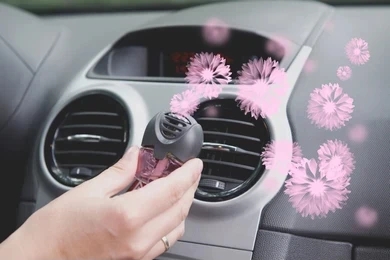


In conclusion, maintaining a clean interior for your car can enhance your overall driving experience, prevent damage or wear on your vehicle, save you money on potential repairs, and help maintain its resale value. With regular cleaning and maintenance, while following the tips mentioned above, you can enjoy years of comfortable and enjoyable driving.
Step-by-step guide on how to thoroughly clean the interior of your car.
To perform interior car detailing, follow these simple steps to achieve a comprehensive and expert cleaning. With the necessary equipment at hand, you can proceed with the following instructions:
-
Preparing your car's interior for cleaning.
To make the cleaning process more convenient and thorough, begin by removing any personal belongings, trash, and loose items from your car. This step will help you avoid overlooking any areas and make it easier to clean your vehicle effectively.
-
Vacuum cleaning and dusting.
To begin, it is recommended to vacuum the entire interior of your car. This includes all seats, carpets, floor mats, and any tight spaces or corners that may be difficult to reach. It is important to pay special attention to areas where dirt and debris tend to accumulate, such as under the seats and in between seat cushions. Using the appropriate attachments for the vacuum will help reach these areas.


After vacuuming, take a soft-bristled brush or a microfiber cloth and use it to dust off the dashboard, center console, and door panels. By doing this, any loose dirt or debris will be removed, and the surfaces will be ready for a more thorough cleaning.
-
Cleaning the Upholstery and fabric.
To effectively clean your car's upholstery and fabric, ensure that you select a cleaner suitable for the specific type of upholstery you have. Read and follow the instructions on the product label carefully. Use a microfiber cloth or a soft brush to gently scrub the stained or dirty areas. If the stains prove difficult to remove, you may need to repeat the cleaning process.
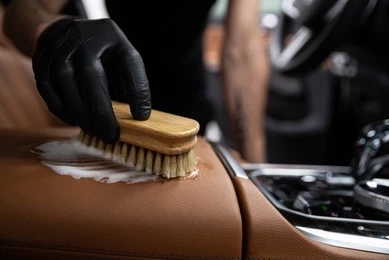
-
Cleaning the seat belts.
Seat belts are often neglected during cleaning because they are not always visible. However, they are frequently touched objects in a car and can easily become dirty from spilled food, coffee, or hand cream. To clean them, you can use a soft-bristled brush with dish soap and warm water. After scrubbing, rinse them with water and use a clean towel to remove any excess water. This will help keep the seat belts clean and free from germs.

-
Treating leather surfaces.
Properly cleaning and conditioning the leather upholstery and components of your car is crucial. You should use a leather cleaner to eliminate any dirt and grime, followed by the application of a leather conditioner to moisturize and safeguard the surfaces. It's essential to adhere to the manufacturer's guidelines for the products utilized in this process, as they may differ.
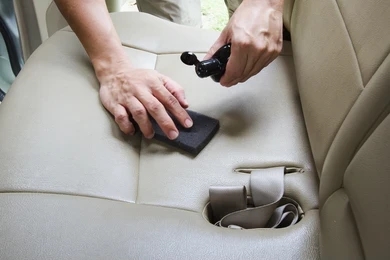
-
Cleaning and conditioning your car's dashboard and panel.
Cleaning the interior of a car can be an easy task if done correctly. To effectively clean surfaces like the dashboard and door panels, you can use an all-purpose cleaner or a product made specifically for car interiors. Simply apply the cleaner or product onto a microfiber cloth and gently wipe the surfaces, removing any dust, fingerprints, or stains. To give the surfaces a shiny finish and provide long-lasting protection, you can use an interior protectant.
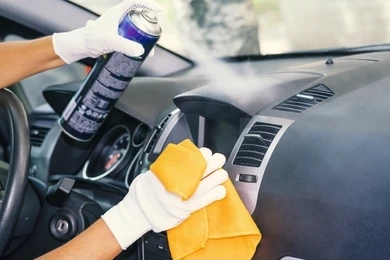
-
Polishing and protecting your car's interior surfaces.
To enhance the shine and protect your car's surfaces, it is recommended to use a non-greasy interior polish. Use a clean microfiber cloth to apply the polish, following the instructions provided with the product. It's essential to avoid applying excessive amounts of polish that could leave a slippery film on the surface of your car.
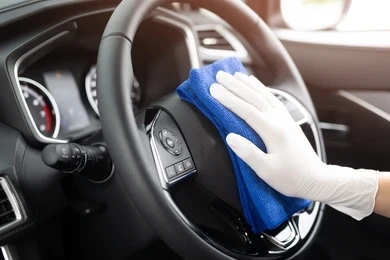
In conclusion, keeping the interior of your car clean is essential for both hygiene and aesthetics. By adhering to these step-by-step instructions, you can ensure that your car's interior is cleaned thoroughly and effectively. Regular cleaning enhance your driving experience and help keep your car looking great for years to come.